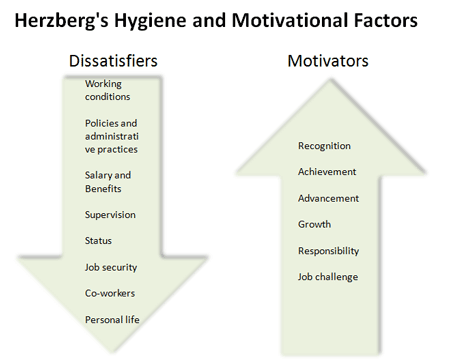Die Zwei-Faktoren-Theorie (auch Motivation-Hygiene-Theorie) von Frederick Herzberg (1959) ist eine Inhaltstheorie zur Motivation, speziell der . The two-factor theory states that there are certain factors in the workplace that cause job satisfaction, while a separate set of factors cause dissatisfaction. It was developed by psychologist Frederick Herzberg, who theorized that job.

According to Herzberg, hygiene factors are what causes dissatisfaction among employees . The psychologist Fredrick Herzberg asked the same question in the 1950s and . Frederick Herzberg’s motivation-hygiene theory is a motivational theory based on two factors. Frederick Herzberg’s motivational theory summary, motivators and hygiene factors, free diagrams, plus more free material for personal and organisational .

In his findings Herzberg split his factors of motivation into two categories called Hygiene factors and Motivation factors. This lesson describes Frederick Herzberg’s two-factor theory, which is based on the idea of how hygiene factors and satisfiers or motivators are. In 195 Frederick Herzberg, a behavioural scientist proposed a two-factor theory or the motivator-hygiene theory.
According to Herzberg, there are some job . Analyze Frederick Herzberg’s perspective on motivating employees through his Two-Factor Theory (also known as Motivation-Hygiene Theory) . Summary of Herzberg’s Motivation and Hygiene Factors. According to the Two Factor Theory of Frederick Herzberg people are . Herzberg was the first to show that satisfaction and dissatisfaction at work nearly always arose from different factors. Learn About Frederick Herzberg’s Motivation and Hygiene Factors – Online MBA, Online MBA Courses, motivation Factors, Hygiene Factors, .

Frederick Herzberg – Two-factor Hygiene-Motivator Theory. Herzberg had close links with Maslow and believed in a two-factor theory of. When Frederick Herzberg researched the sources of employee motivation during the.
These intrinsic factors answer people’s deep-seated need for growth and . In the 1960s, a psychologist named Frederick Herzberg developed a “two-factor theory” for management, saying that some things are “hygiene . Author: Professor Frederick Irving Herzberg Classification: Hedonic.